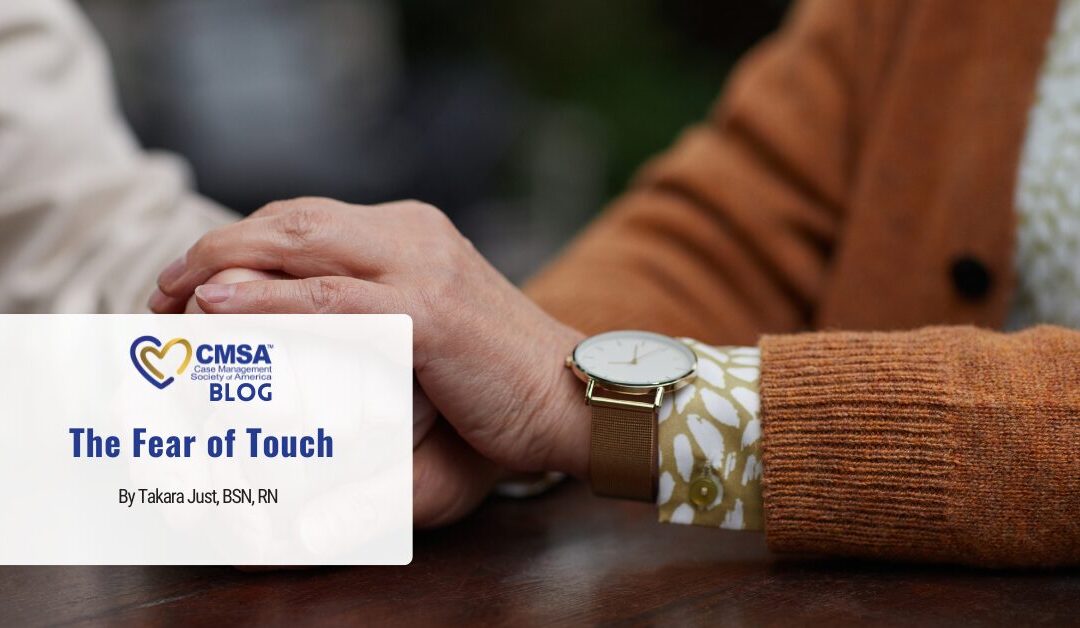By Takara Just, BSN, RN
I was a nurse who lost the importance of touch.
You see, as a nurse, as a case manager, you touch the lives of so many around you, for good or for ill, in so many variations of the word, that over time, the word loses its meaning. A brush of the arm, a snap of the glove, the wrestling of limbs. A task that needs done, a day in the job of what is frequently called “hands-on care” that becomes disassociated from the meaning of the words—a detachment between the work and the hands performing it.
Until one man, a father far from home, trembled.
He was a quiet man, living in the hospital with his child. He was a refugee—a man who had left all he had known to give his sick child a chance. After weeks of steady treatment, of slow tube feeds, difficult line placements, and daily infusions, his child was finally stable. Ready to go, if not to their home, at least to a room outside of the colorful, dispassionate walls of a children’s hospital shining like a garish caricature of the reality within.
His child was ready. But he, the father, was not.
You see, he could no longer touch his child without fear of breaking them. He shook at the thought of dirty gloves brushing sterile lines, of invisible bacteria festering in a bag kept a little too warm for just a little too long, of a tug of a line pulling blood out of the tiny, fragile chest. He could not touch his child for fear of throwing them back into sickness, into infection, into bony limbs and gaunt eyes. For weeks, the multidisciplinary team tried everything to teach this man how to care for his own flesh and blood, assuring him that a nurse would visit twice a week to support his efforts, working tirelessly to transition his child back into a more stable childhood.
But this is not a success story for him. We failed, he failed, and the child stayed.
And yet, his inability to touch his child reminded this nurse just how important touch is. How a twist of syringe can make fingers tremble. How a missing shipment of feeding bags from a home medical vendor can trigger a panic attack. How the deliberate movement of my hand, slipping gently through tangled hair, punching in numbers to make a call, can shake mountains and move hearts.
In the end, the mother was the figurative hero of the story. She came, she divided, and she conquered the skills to care for her child in less than forty-eight hours. The child left the hospital carried by its mother. The father carried the car seat. Still quiet, still scared.
And yet, what an act of love, of accountability, to not touch that which he felt he could not hold.
As a nurse, the humble light in which this man viewed the danger of his hands stopped my own in a different way, in a binding way. What were my hands accountable for? Did they watch what they held? Did they reach when they were needed? Did they hold back when it was beyond my ability to give, or perhaps even more importantly, beyond my ability to give well?
I once thought fear was binding. Thanks to this man, I learned that fear was loving, too. I learned to hold the fear of my own hands, to examine it, to harness it between my teeth and reign in the carelessness that slips so insidiously, so easily, into the repetitive work that we do. I watch my fingers. I watch my words. I watch the care they provide, remembering the man who knew that touch could break as well as build, and that in the field of “hands-on care,” the hands providing it must deliver it with intention as well as humanity.
Only one month remains for CMSA Members to save $35 on registration for our highly anticipated Virtual Leadership Conference!
Join your peers for a dynamic live Zoom event on Saturday, October 11, 2025, from 10 a.m. - 5 p.m. Eastern. This conference is designed to equip you with the skills and knowledge to lead with impact.
Register now at: https://cmsa.org/virtual-leadership-conference-2025/
Bio: Takara Just is the RN Supervisor for Transitional and Ambulatory Care Management for the Salt River Pima-Maricopa Indian Community (SRPMIC) at River People Health Center. They hold a Bachelor of Science in Nursing from Arizona State University and completed an undergraduate thesis through Barrett, the Honors Program that was displayed as a poster presentation at the 51st Western Institute of Nursing research conference in 2018. After working in inpatient pediatrics, Takara transferred to adult critical care during the covid-19 pandemic and later decided to pursue case management as a more holistic means of caring for the whole patient outside of the immediate bedside environment. As a nurse supervisor working for the SRPMIC tribal community, Takara is working to make high-quality care accessible to vulnerable populations by working with the Senior Nurse Manager at River People Health Center to develop a multi-disciplinary case management model in the outpatient primary care sett

